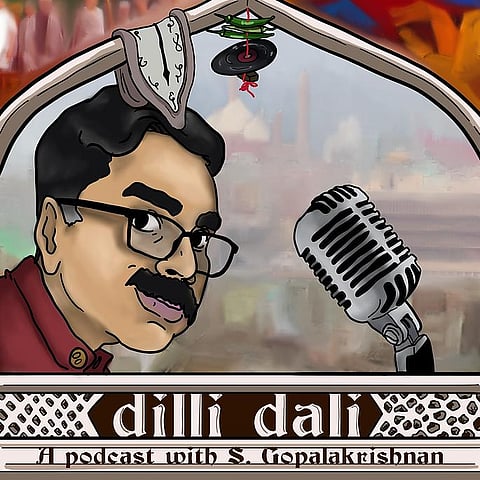

Iraqi journalist Muntadhar-al Zaidi hurled a shoe at former US President George W Bush in 2008 as a mark of protest. More than 90 years prior to this incident, Mahatma Gandhi gifted a pair of sandals to General Jan Smuts, the former Prime Minister of South Africa who was also the jailer of the South African prison where Gandhi spent some time as prisoner. In both these incidents, the shoe represents a common yet different object that marked events of importance in world history.
This anecdote, shared by S Gopalakrishnan in Dilli Dali—a Malayalam podcast that he launched in February 2020—is one of the many interesting observations that he routinely discusses with his listeners. Gopalakrishnan, who was once a programme executive at the All India Radio, hosts this podcast out of his love and passion for the audio medium.
Socio-political discourse
Dilli Dali was born as a response to the February 2020 riots that took place in northeast Delhi. Saddened by the situation in the city, Gopalakrishnan took to podcasting to reflect upon the incident and, by extension, other issues that constantly attack the cultural being of our society.
Now with about 100 episodes, this podcast regularly touches upon various aspects of politics, culture, and music. “The podcast is mostly my response to the contemporary cultural life of people. It deals with the politics and cultural aspects of human existence, and has elements of socio-politics, art, and philosophy. It’s not like a straight discussion but more of a reflection of the society,” shares Gopalakrishnan.
Talking about his decision to name the podcast Dilli Dali—it is the title of a famous
Malayalam poem by bilingual literary critic and poet K Satchidanandan—Gopalakrishnan states that he was looking to dissect socio-cultural affairs “through the lens of both reality and surreality”.
The podcast, which has barely completed two years, has become extremely popular among listeners. “The response to Dilli Dali has been great. There are people who regularly look forward to the episodes. I did not expect the listenership to be so huge,” says the Sahitya Akademi Award winner. The guests on Dilli Dali—historian Ramachandra Guha, vocalist TM Krishna, political cartoonist EP Unny—are also from diverse fields.
“About 90 per cent of the podcast is in Malayalam, but if the guest is someone who is not fluent in Malayalam, I speak to them in English as well,” shares Gopalakrishnan who arrived in Delhi 25 years ago, and is currently living in RK Puram. Even though the podcast touches upon myriad themes, his experiences in the Capital act as catalysts in extending key arguments.
Without limiting Dilli Dali to just political and social themes, Gopalakrishnan has also integrated the subject of music into it. From discussing Indian singer Begum Akhtar’s finest ghazals to talking about musical artist Rajan Mishra’s demise due to COVID, the fine art finds prominence in his content. “Music is an important aspect in the podcast. I specifically look at it in a few episodes and all touch upon music as a reflection to day-to-day life,” Gopalakrishnan concludes.